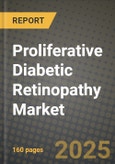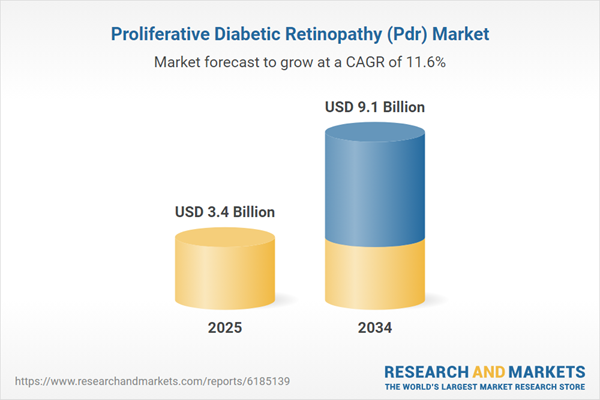Proliferative Diabetic Retinopathy (PDR) Market Overview
The Proliferative Diabetic Retinopathy (PDR) market is witnessing steady growth, driven by the rising global prevalence of diabetes and associated ocular complications. PDR represents the advanced stage of diabetic retinopathy, characterized by abnormal blood vessel growth in the retina, which can lead to severe vision loss or blindness if untreated. As the aging population increases and lifestyle-related diabetes becomes more widespread, the burden of diabetic eye diseases is intensifying. The market for PDR management includes anti-VEGF (vascular endothelial growth factor) therapies, corticosteroids, laser photocoagulation, and vitreoretinal surgery. Anti-VEGF drugs such as ranibizumab and aflibercept are increasingly used due to their effectiveness in halting neovascularization and improving visual outcomes. The ongoing need for early detection, effective treatment, and patient education is fueling investment in diagnostic imaging tools and novel therapeutic approaches. With healthcare systems increasingly recognizing diabetic retinopathy as a public health concern, PDR remains a critical area of focus in ophthalmology.The PDR market witnessed considerable advancements in both treatment innovation and screening technologies. Pharmaceutical companies accelerated research into long-acting intravitreal implants and combination therapies that reduce treatment frequency while enhancing efficacy. Notably, clinical trials for biosimilars of popular anti-VEGF agents gained momentum, promising greater accessibility and cost-effectiveness. AI-based retinal imaging systems were adopted in several healthcare networks to support early diagnosis and remote screening, particularly in underserved regions. Patient awareness campaigns conducted by NGOs and government agencies improved screening rates and early intervention outcomes. Additionally, laser therapy technologies saw refinement, with pattern scanning lasers providing faster, more precise treatments. Collaborations between tech firms and ophthalmology clinics supported the development of cloud-based platforms to store and analyze retinal imaging data, further enabling real-time decision-making. Despite these positive strides, access to care remained uneven, with treatment availability in low-income regions still facing significant barriers.
The PDR market is expected to evolve toward more personalized and preventive care models. Ongoing R&D is focused on gene therapy and regenerative medicine approaches aimed at reversing retinal damage rather than only managing symptoms. Integration of wearable glucose monitors with ophthalmic software is anticipated to improve the monitoring of diabetic complications, potentially linking systemic glucose control directly to retinal health. AI-driven platforms will continue to enhance diagnostic precision, allowing clinicians to predict disease progression and tailor interventions accordingly. Moreover, the launch of biosimilars and cost-effective treatment alternatives will improve affordability, encouraging broader adoption across middle- and low-income economies. Advances in teleophthalmology and portable diagnostic devices are also expected to extend specialized care into remote regions. As healthcare policies increasingly emphasize chronic disease management, the role of endocrinologists, diabetologists, and ophthalmologists in collaborative care will strengthen, paving the way for integrated treatment pathways that improve long-term visual outcomes for PDR patients.
Key Insights: Proliferative Diabetic Retinopathy (Pdr) Market
- Artificial intelligence is transforming retinal screening, enabling automated detection of diabetic retinopathy in early stages and supporting remote diagnosis in primary care settings.
- Development of long-acting drug delivery systems, including biodegradable implants and injectable suspensions, is reducing treatment burden for both patients and physicians.
- Gene therapy and cell-based regenerative treatments are gaining traction in clinical research as potential long-term solutions for reversing retinal damage in advanced PDR cases.
- Biosimilar anti-VEGF drugs are entering the market, providing more affordable therapeutic alternatives and increasing access in price-sensitive regions.
- Teleophthalmology and mobile retinal imaging devices are expanding access to early diagnosis and follow-up care, particularly in rural and low-resource communities.
- Rising global diabetes prevalence is directly increasing the number of individuals at risk of developing diabetic retinopathy and progressing to PDR.
- Advancements in ophthalmic imaging and diagnostic tools are improving early detection rates and enabling timely intervention, reducing the risk of vision loss.
- Supportive government initiatives and public awareness programs are promoting regular eye exams among diabetic patients, fueling screening uptake.
- Continuous pharmaceutical innovation in anti-VEGF agents and combination therapies is enhancing clinical outcomes and expanding treatment options for PDR.
- Limited access to advanced eye care facilities and high treatment costs in low- and middle-income countries hinder early diagnosis and timely treatment of PDR, contributing to preventable vision loss.
Proliferative Diabetic Retinopathy (Pdr) Market Segmentation
By Treatment Type
- Anti-VEGF (Vascular Endothelial Growth Factor) Therapy
- Intraocular Steroids
- Laser Surgery
- Vitrectomy
By Mode of Administration
- Injectables
- Oral
- Other Mode Of Administrations
By Application
- Hospitals
- Clinics
- Other Applications
Key Companies Analysed
- Pfizer Inc.
- Johnson and Johnson Limited
- F. Hoffmann-La Roche Ltd.
- Merck and Co. Inc.
- AbbVie Inc.
- Bayer AG
- Novartis AG
- Sanofi S.A.
- Bristol-Myers Squibb Company
- AstraZeneca PLC
- GSK PLC
- Takeda Pharmaceutical Company Limited
- Eli Lilly and Company
- Amgen Inc.
- Novo Nordisk A/S
- Boehringer Ingelheim International GmbH
- Merck KGaA
- Kubota Vision Inc.
- Teva Pharmaceutical Industries Ltd.
- Regeneron Pharmaceuticals Inc.
- Mylan N.V.
- Santen Pharmaceutical Co. Ltd.
- Lupin Limited
- Genentech Inc.
- Sirnaomics Inc.
Proliferative Diabetic Retinopathy (Pdr) Market Analytics
The report employs rigorous tools, including Porter’s Five Forces, value chain mapping, and scenario-based modeling, to assess supply-demand dynamics. Cross-sector influences from parent, derived, and substitute markets are evaluated to identify risks and opportunities. Trade and pricing analytics provide an up-to-date view of international flows, including leading exporters, importers, and regional price trends.Macroeconomic indicators, policy frameworks such as carbon pricing and energy security strategies, and evolving consumer behavior are considered in forecasting scenarios. Recent deal flows, partnerships, and technology innovations are incorporated to assess their impact on future market performance.
Proliferative Diabetic Retinopathy (Pdr) Market Competitive Intelligence
The competitive landscape is mapped through proprietary frameworks, profiling leading companies with details on business models, product portfolios, financial performance, and strategic initiatives. Key developments such as mergers & acquisitions, technology collaborations, investment inflows, and regional expansions are analyzed for their competitive impact. The report also identifies emerging players and innovative startups contributing to market disruption.Regional insights highlight the most promising investment destinations, regulatory landscapes, and evolving partnerships across energy and industrial corridors.
Countries Covered
- North America - Proliferative Diabetic Retinopathy (Pdr) market data and outlook to 2034
- United States
- Canada
- Mexico
- Europe - Proliferative Diabetic Retinopathy (Pdr) market data and outlook to 2034
- Germany
- United Kingdom
- France
- Italy
- Spain
- BeNeLux
- Russia
- Sweden
- Asia-Pacific - Proliferative Diabetic Retinopathy (Pdr) market data and outlook to 2034
- China
- Japan
- India
- South Korea
- Australia
- Indonesia
- Malaysia
- Vietnam
- Middle East and Africa - Proliferative Diabetic Retinopathy (Pdr) market data and outlook to 2034
- Saudi Arabia
- South Africa
- Iran
- UAE
- Egypt
- South and Central America - Proliferative Diabetic Retinopathy (Pdr) market data and outlook to 2034
- Brazil
- Argentina
- Chile
- Peru
Research Methodology
This study combines primary inputs from industry experts across the Proliferative Diabetic Retinopathy (Pdr) value chain with secondary data from associations, government publications, trade databases, and company disclosures. Proprietary modeling techniques, including data triangulation, statistical correlation, and scenario planning, are applied to deliver reliable market sizing and forecasting.Key Questions Addressed
- What is the current and forecast market size of the Proliferative Diabetic Retinopathy (Pdr) industry at global, regional, and country levels?
- Which types, applications, and technologies present the highest growth potential?
- How are supply chains adapting to geopolitical and economic shocks?
- What role do policy frameworks, trade flows, and sustainability targets play in shaping demand?
- Who are the leading players, and how are their strategies evolving in the face of global uncertainty?
- Which regional “hotspots” and customer segments will outpace the market, and what go-to-market and partnership models best support entry and expansion?
- Where are the most investable opportunities - across technology roadmaps, sustainability-linked innovation, and M&A - and what is the best segment to invest over the next 3-5 years?
Your Key Takeaways from the Proliferative Diabetic Retinopathy (Pdr) Market Report
- Global Proliferative Diabetic Retinopathy (Pdr) market size and growth projections (CAGR), 2024-2034
- Impact of Russia-Ukraine, Israel-Palestine, and Hamas conflicts on Proliferative Diabetic Retinopathy (Pdr) trade, costs, and supply chains
- Proliferative Diabetic Retinopathy (Pdr) market size, share, and outlook across 5 regions and 27 countries, 2023-2034
- Proliferative Diabetic Retinopathy (Pdr) market size, CAGR, and market share of key products, applications, and end-user verticals, 2023-2034
- Short- and long-term Proliferative Diabetic Retinopathy (Pdr) market trends, drivers, restraints, and opportunities
- Porter’s Five Forces analysis, technological developments, and Proliferative Diabetic Retinopathy (Pdr) supply chain analysis
- Proliferative Diabetic Retinopathy (Pdr) trade analysis, Proliferative Diabetic Retinopathy (Pdr) market price analysis, and Proliferative Diabetic Retinopathy (Pdr) supply/demand dynamics
- Profiles of 5 leading companies - overview, key strategies, financials, and products
- Latest Proliferative Diabetic Retinopathy (Pdr) market news and developments
Additional Support
With the purchase of this report, you will receive:- An updated PDF report and an MS Excel data workbook containing all market tables and figures for easy analysis.
- 7-day post-sale analyst support for clarifications and in-scope supplementary data, ensuring the deliverable aligns precisely with your requirements.
- Complimentary report update to incorporate the latest available data and the impact of recent market developments.
This product will be delivered within 1-3 business days.
Table of Contents
Companies Mentioned
- Pfizer Inc.
- Johnson and Johnson Limited
- F. Hoffmann-La Roche Ltd.
- Merck and Co. Inc.
- AbbVie Inc.
- Bayer AG
- Novartis AG
- Sanofi S.A.
- Bristol-Myers Squibb Company
- AstraZeneca PLC
- GSK PLC
- Takeda Pharmaceutical Company Limited
- Eli Lilly and Company
- Amgen Inc.
- Novo Nordisk A/S
- Boehringer Ingelheim International GmbH
- Merck KGaA
- Kubota Vision Inc.
- Teva Pharmaceutical Industries Ltd.
- Regeneron Pharmaceuticals Inc.
- Mylan N.V.
- Santen Pharmaceutical Co. Ltd.
- Lupin Limited
- Genentech Inc.
- Sirnaomics Inc.
Table Information
| Report Attribute | Details |
|---|---|
| No. of Pages | 160 |
| Published | October 2025 |
| Forecast Period | 2025 - 2034 |
| Estimated Market Value ( USD | $ 3.4 Billion |
| Forecasted Market Value ( USD | $ 9.1 Billion |
| Compound Annual Growth Rate | 11.5% |
| Regions Covered | Global |
| No. of Companies Mentioned | 25 |









